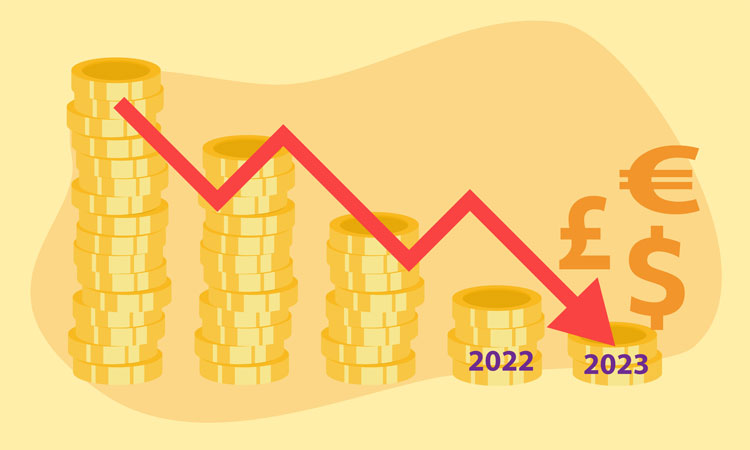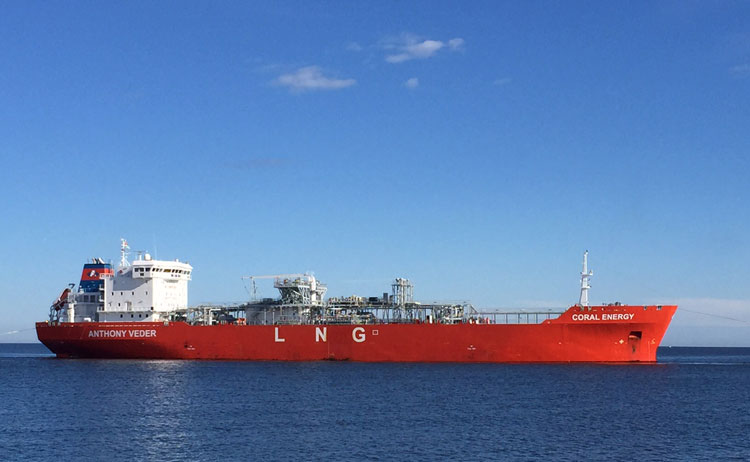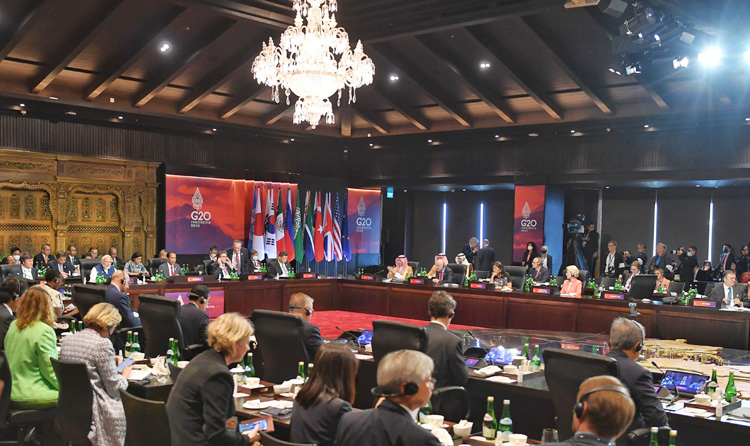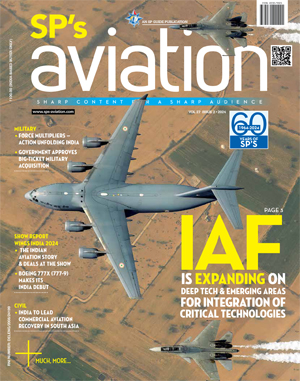INDIAN ARMED FORCES CHIEFS ON
OUR RELENTLESS AND FOCUSED PUBLISHING EFFORTS

SP Guide Publications puts forth a well compiled articulation of issues, pursuits and accomplishments of the Indian Army, over the years

I am confident that SP Guide Publications would continue to inform, inspire and influence.

My compliments to SP Guide Publications for informative and credible reportage on contemporary aerospace issues over the past six decades.
2022: A Tumultuous Year
As 2022 draws to a close, here is a snapshot of the year gone by and the changed geopolitical world that it leaves behind
 |
The Author is former Chief of Staff of a frontline Corps in the North East and a former helicopter pilot. He earlier headed the China & neighbourhood desk at the Defence Intelligence Agency. He retired in July 2020 and held the appointment of Addl DG Information Systems at Army HQ. |

Messi winning the FIFA World Cup for Argentina will be remembered for long as the signature event of 2022, as the year winds down to its closing days. The match was mesmerising, professional to the core, captivating till the last, and left fans in the stadium and in front of screens across the world dazed and euphoric. A cheerful goodbye to an otherwise eventful and some would call a watershed year in the planet's history.
Nearly two years after rumblings of a disruptive virus began emerging from China, the world entered 2022 with hope that the deadly virus simply melts away. The lockdowns, the disruptions in global supply chains, the economic hardships afflicting billions across the globe with job losses, the painful bans on travel and tourism, and the enduring struggles of hundreds of thousands of medical professionals to save lives seemed eternal. And then the miracle vaccines emanating from multiple laboratories to provide the much-needed respite gave us hope. The last big surge of Omicron variety that started in India around mid-January 2022 dissipated without inflicting the anticipated extent of damage. By middle of March, life started returning to normalcy, slowly at first, with a tinge of disbelief.
That reset in the geopolitical, economic and energy power blocks is a direct fallout of the Ukraine war
But even while the Omicron was peaking in India, an ugly war began in Ukraine on February 24, 2022. That devastating war continues till date, with no amicable end in sight, no agenda for peace talks and possibly little interest from both sides to seek a quick resolution. Of course, it must be understood that two sides we are referring to are not Russia and Ukraine but Russia and the US led west. Ukraine is merely a pawn in the global reset that is under works.
That reset in the geopolitical, economic and energy power blocks is a direct fallout of the Ukraine war, though these consequences were perhaps unintended. Surging global energy, food, and fertiliser prices due to the conflict are getting in the way of economic pragmatism. The era of free-spirited globalisation, free markets, free flow of finance, and technology transfers in manufacturing enabled by revolution in infotech so triumphantly announced by the Thomas Friedman in his tome "The World is Flat" is over. Observant experts believe the world has now entered a period of "resource nationalism," with Europe having very limited energy options, Russia's forex reserves lying idle, and the US restricting technology exports to China which over the past three decades had turned into itself into 'the World's Factory.'

Financial sanctions by themselves are shocking and an unprecedented barrage was unleashed on Russia as soon as the war started. Russian forex parked in American and European banks to the tune of $600 billion were frozen and Russia denied use of SWIFT payment system and settlements through the BIS. But as the west has now realised, Russia has basically weathered the storm. While many of Russia's former international partners have reduced or cut ties with the country, Russia has broadly kept its oil production and exports at close to pre-invasion levels by increasing exports elsewhere, including to China, India, and Turkey. So, if the sanctions may result in an estimated 4 percent contraction in the Russian economy, we are probably looking at 30 to 35 percent contraction in Ukraine's economy. Inflation in Ukraine is running at over 26 percent against Russia's 1.4 per cent.
Another significant fallout of the war is that the world is getting more militarised, a dream scenario unfolding for arms manufacturers
Russia cut gas flows to the EU by around 80 per cent between May and October 2022. Unsuspecting Europeans now ferry LNG across the Atlantic from the USA at over five times the pre-war prices. Industries in the Euro-engine Germany are shuttering due to high gas prices. In a sense de-industrialisation of the Eurozone has set in. Driven by high energy prices, the EU annual inflation was 11.5 per cent in October 2022. A year earlier, the rate was 4.4 per cent. The eurozone and most EU countries will head to an economic recession in the last quarter of 2022, according to the European Commission's autumn economic forecast.
Another significant fallout of the war is that the world is getting more militarised, a dream scenario unfolding for arms manufacturers. The German budget this year will allocate 100 billion euros ($109 billion), which is more than double the entire 2021 defence bill of 47 billion euros. Just a few days back, Japan has said it would begin a once-unthinkable $320 billion military build-up. So is the case with Taiwan, South Korea, and a host of NATO countries. Of course, the five largest companies in the world that manufacture weapons are all American: Lockheed Martin, Raytheon, Boeing, Northrop Grumman, and General Dynamics. The arms dealers' share price rose by 23 per cent following the outbreak of fighting in Ukraine.

It is not just the dealers making profit. Over the past months, reports have emerged showing how members of the US Congress stand to personally profit off the war with lawmakers or their spouses holding stock in arms dealers such as Lockheed Martin or Raytheon Technologies. Likewise, politicians in the UK such as members of the House of Lords made tens of thousands of pounds by owning shares in BAE Systems, the largest British weapons manufacturer and sixth in the world.
A bright spot in this global doom is India. Projected to grow at over 7 per cent with inflation under control, India would be at the CenterStage as it chairs the G20 and the SCO.
With return of coal as an ineluctable energy source, the climate goals are in the backburner. There is little global interest in tackling the famine, refugee crisis, interminable coups, and lawlessness unleashed by radical Islamists in Africa. Taliban has returned with a bang, just announcing a closure of universities for women. Worse, as the year draws to a close, the threat of the COVID virus is back with a huge surge of the BF.7 variant in China. The Indian Health Ministry has just issued an ominous precautionary guideline.
A bright spot in this global doom is India. Projected to grow at over 7 per cent with inflation under control, India would be at the CenterStage as it chairs the G20 and the SCO. Armed with a young working population, a sustained vaccination campaign, pragmatic industrial rejuvenation under 'Atmanirbhar Bharat' and astute foreign policy that navigates the choppy waters of Big Power Rivalry, India must carefully chart its destined course.





